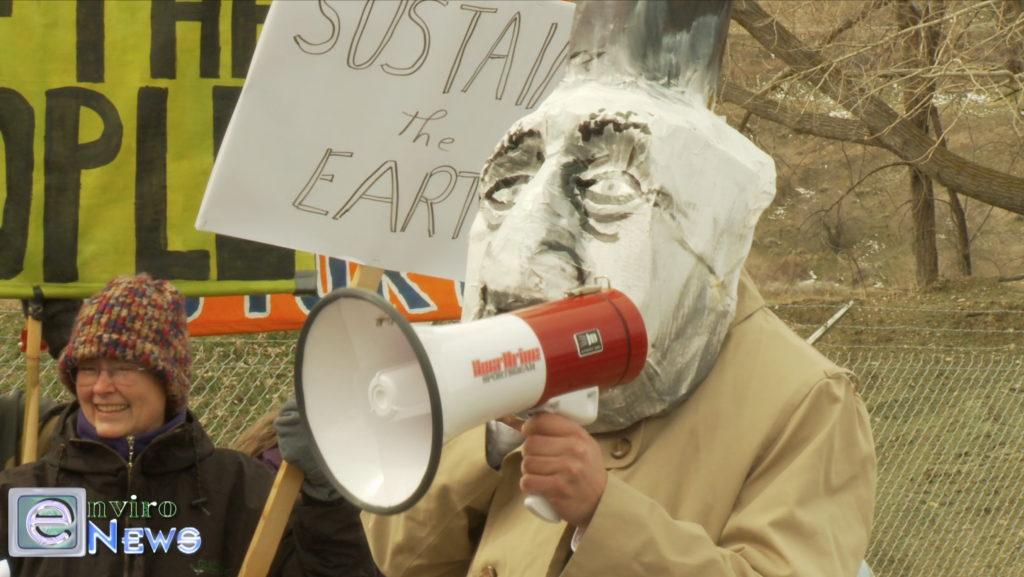ACLU Reveals Bills in 20 States Aiming to Criminalize Peaceful Protest — Is Your State on the List?

(EnviroNews DC News Bureau) — Since the election of Donald Trump, public protests such as the Women’s March, Climate March and the March for Science, have flourished. In response, more than 30 bills spanning 20 states have been introduced in an effort to increase the penalties for peaceful protest, according to the American Civil Liberties Union Foundation (ACLU). Representatives from the United Nations (UN) Office of the High Commissioner for Human Rights (OHCHR) wrote to the U.S. government in late March 2017, expressing concern over these bills and requesting an explanation regarding their “[incompatibility] with U.S. obligations under international human rights law.”
Protest behaviors such as gathering in large groups, wearing face coverings and interfering with roads or “critical infrastructure” are targeted in the various Republican-led legislative maneuvers. “This flood of bills represents an unprecedented level of hostility toward protesters in the 21st century. And, many of these bills attack the right to speak out precisely where the Supreme Court has historically held it to be the most robust: in public parks, streets and sidewalks,” Vera Eidelman of the ACLU’s Speech, Privacy and Technology Project told The Guardian.
She also pointed out the measures are “especially pervasive” in states where protesting has been abundant. For example, the ACLU discusses a slew of bills introduced in North Dakota in response to the historic Dakota Access Pipeline (DAPL) protests. In March, HB 1304 was signed into law, which penalizes the wearing of masks at demonstrations, as was HB 1426, which makes protest penalties a class B felony if 100 or more people are involved, with a maximum prison sentence of 10 years.

A North Dakota bill stating drivers who hit protesters on the road unintentionally “would not be held liable for any damages,” failed to pass by nine votes in February. But, a similar bill is currently under review in Tennessee that “provides civil immunity for the driver of an automobile who injures a protester who is blocking traffic in a public right-of-way if the driver was exercising due care.”
5,000 protestors gather at the Utah State Capitol for the largest air pollution protest in history. Utah, the reddest state in America, is not amongst the 20 states with bills that seek to increase penalties for protesters.
The ACLU also shares that peaceful demonstration regulations were strengthened at Denver International Airport following protests over President Trump’s Muslim travel-ban. Following public outcry and marches relating to the police shooting of Philando Castile in Minnesota, bills were drafted to increase punishments for highway protests and to charge participants the cost of policing the action if arrestees are convicted. The ACLU has created an interactive map detailing state legislature anti-protest bills. Readers can view synopses of bills in their own state by simply maneuvering their cursor and clicking.

As previously stated, it’s not only the ACLU that’s vehemently opposed to these actions by lawmakers — the United Nations is also now involved. The UN letter relating to this type of legislation is titled “Mandates of the Special Rapporteur on the promotion and protection of the right to freedom of opinion and expression, and the Special Rapporteur on the rights to freedom of peaceful assembly and of association,” and is from special rapporteurs David Kaye and Maina Kiai. It is addressed to Theodore Allegra, the Deputy Chief of Mission at the U.S. Mission to the United Nations as well as other international organizations in Geneva.
Like the ACLU, the rapporteurs collected a list of U.S. bills aiming to limit demonstrators’ rights and presented the information in their communication. In the letter, Oklahoma’s HB 1123 is mentioned specifically, as a measure which includes new penalties for trespassing on “critical infrastructure,” including oil refineries and chemical plants. Trespassing on, interfering with or damaging these facilities would be punishable by a variety of fines and prison terms, ranging from $1,000 and six months, up to $100,000 and 10 years. On May 3 this bill was approved, but has not yet been signed by Governor Mary Fallin (R).

“We are concerned this bill would target peaceful protests in certain contexts, such as protests which focus on environmental rights, imposing disproportionate penalties on protestors,” the UN representatives stated, specifically referencing DAPL.
Outraged protestors descend on Chevron refinery in Salt Lake City Utah following a string of dangerous “red air days.”
The UN asks Allegra to respond to their message with five separate requests, including this appeal:
Please explain how the aforementioned bills are in accordance with the United States of America’s obligations under international human rights law, particularly with regard to the rights of freedom of opinion and peaceful assembly as enshrined in articles 19 and 21 of the International Covenant on Civil and Political Rights (ICCPR), as well as articles 19 and 20 of the Universal Declaration of Civil Rights (UDHR), respectively.
UN rapporteurs Kaye and Kiai also say they “believe that the wider public should be alerted to the potential implications of the above-mentioned allegations.” They alert the U.S. representative that these UN findings and requests will be made public online, and that the U.S. responses will also be posted online “as well as in the regular periodic Communications Report to be presented to the Human Rights Council.”
The ACLU promises to “fight in statehouses against any bill that violates the First Amendment, and for any that become law, we’re hopeful the courts will see these bills for what they are: unlawful infringements on our right to speak.”
FILM AND ARTICLE CREDITS
- Julia Travers - Journalist, Author




3 thoughts on “ACLU Reveals Bills in 20 States Aiming to Criminalize Peaceful Protest — Is Your State on the List?”